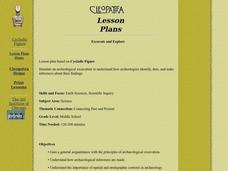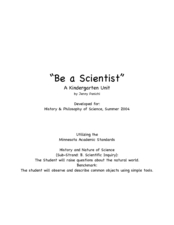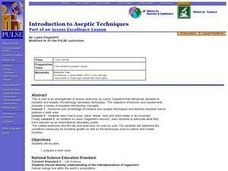Curated OER
African Americans in Science
Students examine the life of renowned African American scientists. In this science literacy lesson, students explore a website containing profiles and achievements of past and present African American scientists. They prepare a poster...
Curated OER
Using Science to Explore - Science Worksheets
In this science exploration worksheet, students will compare the differences between science and technology. Students will come up with a way to use technology to explore a deep well. This worksheet has 7 short answer questions.
Curated OER
What is Radioactivity?
Young scholars use a geiger counter to record changes in the amount of radioactivity produced by different objects. They research articles which mention radiation and discuss them. They work together to complete an activity and worksheet.
Curated OER
Tsunami Simulation Experiment
Students examine the importance of tsunami warning systems. They read and discuss an article, conduct an experiment in a wave tank, calculate wave velocities of tsunamis, and identify what happens to tsunamis as they approach a shoreline.
Michigan Sea Grant
Wetlands
Wetlands may not sound particularly ornate, but they are as important as any habitat! With a hands-on activity, young scientists build a wetland model and observe its many functions in action. They discover the importance of wetlands to...
Curated OER
Holes
Students distinguish between primary and secondary sources when researching on the Internet and evaluating historical records. They recognize important features of a primary source such as the type of document, who created it, what is...
Curated OER
Greenhouse Effect: A Computer Simulation
Students complete an online simulation of the greenhouse effect. In this lesson on the greenhouse effect, students use a website, similar to a webquest, to simulate and answer questions on how the greenhouse effect works. This lesson is...
Curated OER
Monument or Energy?
In this national monument worksheet, learners will read about the national monument in Utah and the pros and cons about it being a protected area. Students will complete 6 short answer questions based on what they read.
Curated OER
Excavate and Explore
Students simulate an archeological excavation to explain how archeologists identify, date, and make inferences about their findings. They explain the importance of spatial and stratigraphic contexts in archaeology.
Curated OER
Be a Scientist: A Kindergarten Unit
Students conduct observations using their five senses. In this science lesson, students describe different states of matter. They investigate the factors affecting mold growth.
Curated OER
Can Worms See?
Second graders discuss the previously created worm compost and the importance of living creatures to the Environment. In this worm lesson, 2nd graders observe worms and record their sensitivity to light. Students design a petri...
Curated OER
Introduction to Aseptic Techniques
Students study bacteria and aseptic microbiology laboratory techniques. They discover how to pour, label, streak, seal and store plates in an incubator and articulate what they have learned via an informational laboratory poster.
.
Curated OER
SPLASH – Monitoring Humpback Whales
Students view a video about the humpback whale and why it is endangered. In this endangered species lesson, students recognize the importance of observing and following an endangered species in an ecosystem. Students identify the animals...
Curated OER
Simple Machines
Fourth graders examine a machine and how its parts work together. In this simple machines lesson, 4th graders work in groups to study different gadgets, analyze how the parts of the gadget work and draw sketches of the gadget. Students...
Curated OER
Biology: living Things and their Environment
Middle schoolers recognize that organisms depend on other organisms. In this organism instructional activity, students understand symbiotic relationships and competition. Middle schoolers explain food chains and food...
Curated OER
Dissecting Owl Pellets
Young scholars dissect owl pellets. In this dissecting owl pellets lesson, students discuss birds of prey and make predictions about what they may find during the investigation. Young scholars tease out skull and bones and try to make a...
Michigan Sea Grant
Fish Identification
Using a dichotomous key, pupils identify characteristics of fish who live in the Great Lakes and explain how these features help them survive. In small groups, class members discover what features scientists consider important and...
Curated OER
Water Works Wonders
Students examine where water is found in the world, how we use it, and the various forms it takes. They observe the refraction of light through a prism, record the day and night sky over a week's time, and create a topographic model of...
Curated OER
Class: What's Fair Game
Fifth graders study fair trade by role-playing a cocoa bean farming situation. In this fair trade lesson, 5th graders role-play as cocoa bean farmers and buyers to learn about fair trade. Students complete a worksheet to assess their...
Curated OER
Energy Efficiency: It really IS important!
Students compare the energy needed to produce new products versus recycling. In this physics lesson, students brainstorm ways to save energy. They create a presentation about the correlation between conserving energy and energy costs.
Curated OER
Is There Life Before 121?
Students observe microbial growth in the lab. In this biology lesson plan, students determine the conditions suitable for bacterial growth. They explain the methods of sterilization and bioburden testing.
Curated OER
Don't Trash the Earth
Middle schoolers experience a hands-on environmental science project. They access about recycling as they collect data on their own family's trash production. Students analyze the data with worksheets, chart the data, and present their...
Curated OER
Is That Icebox Green?
Seventh graders create a timeline of the development of electrical appliances. In this physics lesson, 7th graders explore energy consumption over the past 90 years. They create a poster about their chosen electrical device detailing its...
Computer Science Unplugged
Sharing Secrets—Information Hiding Protocols
Did you know that you can find the average age of a group of people without anyone having to real their age? This resource provides directions for way to do just that. After the activity, class members read a short passage...























